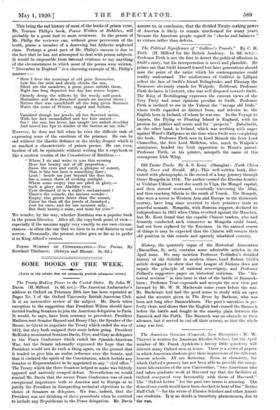The Political Significance of " Gullitxr's Travels." By C. H.
Firth. (H. Milford for the British Academy. Is. 6d. net.)— Professor Firth is not the first to detect the political allusions in Swift's story, but his interpretation is novel and plausible. He points out that Swift himself feared lest later generations should miss the point of the satire which his contemporaries could readily understand. The misfortunes of Gulliver in Liffiput reflect the fate of Swift's friend Bolingbroke, and Flimnap the Treasurer obviously stands for Walpole. Reldresal, Professor Firth declares, is Carteret, who was well disposed towards Swift. The King of Brobdingnag expresses the current views of the Tory Party and some opinions peculiar to Swift. Professor Firth is inclined to see in the Yahoos the "savage old Irish," whom Swift regarded as distinct from, and inferior to, the English born in Ireland, of whom he was one. In the Voyage to Laputa, the Flying or Floating Island is England, with its passion for politics and music and for "projects." Balnibarbi, on the other hand, is Ireland, which was seething with anger against Wood's Halfpence at the time when Swift was completing the book. Professor Firth sees in Lord Munodi the Irish Lord Chancellor, the first Lord Midleton, who, much to Walpole's annoyance, headed the Irish opposition to Wood's patent. Professor Firth, or his printer, misspells the name of this courageous Irish Whig.


































 Previous page
Previous page